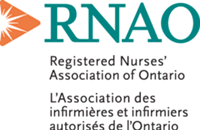Recommendations from Ontario nurses would help deliver the true health system change the public deserves
TORONTO, Nov. 23, 2016 /CNW/ - A unique opportunity to improve timely access to quality health care while fundamentally changing the structure of Ontario's health system is under the microscope this week as committee hearings into Bill 41 take place at Queen's Park.
The Registered Nurses' Association of Ontario (RNAO) is among 30 organizations appearing before the committee and offering its recommendations on Bill 41, the government's Patients First legislation. The association was among the first to applaud Health Minister Eric Hoskins for his bold vision when he released his Patients First discussion paper last December, but says the legislation as currently written falls short of the promise for real health system transformation.
"We are urging Minister Hoskins and Premier Kathleen Wynne to take this once-in-a-generation opportunity and make the changes that will enable Ontarians to get the care they need in a timely and effective way," says RNAO CEO Doris Grinspun, who is presenting at today's hearings. "RNAO is concerned that left as-is, Bill 41 will perpetuate the current limitations of our health system."
RNAO's analysis of Bill 41 reveals significant shortcomings that fail to make the structural and service delivery changes that would bring together disparate parts of the health system and foster person-centred care. For example, the bill's definition of a health service provider leaves out most primary care organizations, home care providers and all 36 public health units. "If you want a truly integrated system where one body – the Local Health Integration Networks (LHIN) – is responsible for planning and funding decisions, then you have to ensure all these important sectors of our health system are included under one umbrella. Otherwise, not much will change, and Ontarians will continue to experience shortfalls in access to care, continuity of care and health system navigation," says Grinspun.
RNAO's submission to the committee recommends the bill be amended to make explicit that the government will create an integrated health system that is anchored in primary care and includes all primary care organizations, public health units and home care providers.
The association is also gravely concerned with language in Bill 41 that positions LHINs as both providers and managers of health services. RNAO's report on system transformation (Enhancing Community Care for Ontarians, 2012) called for the role of LHINs to be expanded to include whole local system planning, funding allocation, monitoring and performance accountability. "But you can't be the captain of the ship and row at the same time," Grinspun says. "That's why we recommend removing all sections of the bill that position LHINs as service providers. That should not be their role, nor will it advance person-centred care."
Carol Timmings, RNAO's president who is joining Grinspun at today's committee hearings, says the association fully supports changes that would eliminate Community Care Access Centres (CCAC), which currently oversee home and supports care services. But the bill misses the mark by fully merging their functions and staff with the LHIN structure. "RNAO is urging that in addition to eliminating the CCACs, the government also avoids the automatic transfer of all CCAC functions, processes and resources to the LHINs. Instead, efforts must be made to transform the funding model in the community away from fee-for-service, as well as tighten the connections between home care and primary care," says Timmings. "We are also urging that the 4,100 RNs who currently work in CCACs as care co-ordinators while employed by the LHINs, be located in primary care, where they can provide a much-needed boost to this vital sector and ensure Ontarians get the continuity of service and health system navigation they need and deserve."
"If Minister Hoskins is serious about putting patients first, sections of Bill 41 must be rewritten to reflect its original intent," Timmings says. "This is a pivotal moment for our health system. We must continue to be bold to affect meaningful change to the health care Ontarians receive."
WHO:
- Carol Timmings, president, RNAO
- Doris Grinspun, chief executive officer, RNAO
WHAT:
- Standing Committee on the Legislative Assembly on Bill 41
WHERE:
- Committee Room 1, Main Legislative Building, Queen's Park, Toronto
WHEN:
- Wednesday, Nov 23, 2016 at 3:15 p.m.
The Registered Nurses' Association of Ontario (RNAO) is the professional association representing registered nurses, nurse practitioners, and nursing students in Ontario. Since 1925, RNAO has advocated for healthy public policy, promoted excellence in nursing practice, increased nurses' contribution to shaping the health-care system, and influenced decisions that affect nurses and the public they serve. For more information about RNAO, visit our website at RNAO.ca or follow us on Facebook and Twitter.
SOURCE Registered Nurses' Association of Ontario

For more information, or to interview a nurse, please contact: Marion Zych Director of Communications, Registered Nurses' Association of Ontario (RNAO), 416-408-5605 / 647-406-5605 (cell), [email protected]

Share this article